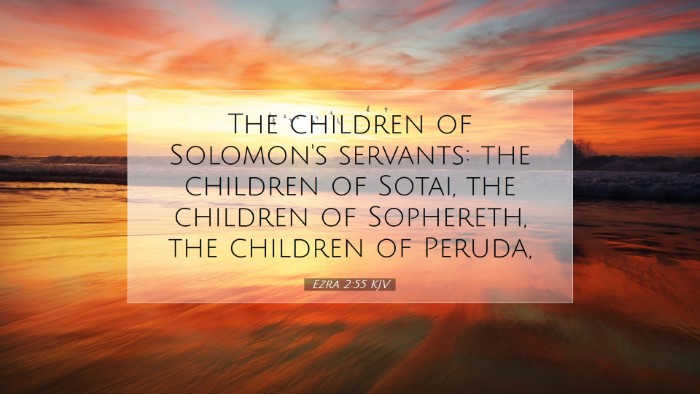Commentary on Ezra 2:55
Ezra 2:55 states:
"The children of Solomon's servants were three hundred ninety and two."
This verse lists the descendants of those who served King Solomon, indicating their numbers as part of the returning exiles from Babylon. Within this brief verse lies rich historical and theological implications suitable for pastoral, scholarly, and devotional contemplation.
Historical Context
The context of Ezra 2 revolves around the return of the Jewish exiles to Jerusalem after the Babylonian captivity. Under the edict of King Cyrus, a remnant was permitted to return and rebuild their homeland. This journey back was significant not only in leading to the restoration of the temple but also in revitalizing national and spiritual identity. The mention of Solomon's servants reflects both a lineage of labor and a continuity of service dedicated to God’s temple.
Significance of the Numbers
Notably, the verse states the number of those returning solely as a succinct record. It emphasizes the importance of numbers in biblical texts, which often signify life, strength, and the fulfillment of promises.
- Connection to God’s Promise: The inclusion of Solomon's servants underscores the reality of God’s enduring covenant. God promised that the descendants of Israel would dwell in the land, serving Him and benefiting from His blessings.
- Servanthood and Leadership: The reference to "Solomon's servants" also reminds the community of the value of servanthood in God’s kingdom. It highlights that even in returning to their homeland, they were expected to continue in the legacy of serving God’s purpose.
Theological Insights
From a theological perspective, the enumeration of Solomon's servants can be seen as a reflection of God’s providence in maintaining a remnant. This remnant carries with it the hope and aspirations of restoring worship and community.
- God’s Faithfulness: The returnees symbolize God’s faithfulness. Despite years of exile, divine promises remain intact as exemplified by the mention of those who served in Solomon’s court.
- Identity and Restoration: The call to remember their identity and purpose in the face of their new circumstances is critical. It encourages the community to reclaim their heritage and recommit to the service of God.
- Role of Servanthood: This serves as an important lesson on the nature of leadership in God’s kingdom, where true greatness comes through humble servanthood, exemplified by Solomon's own reign.
Reflections for Pastors and Theologians
For pastors, this verse serves as a reminder to encourage congregations about the importance of remembrance and identity in Christ. It champions the responsibility of nurturing the next generation to carry forth the legacy of faith. The numbers can also inspire community reflection on their own areas of servanthood:
- Encouragement of Service: Pastors might find this an opportune moment to reflect on the servanthood model of Jesus, encouraging members to serve diligently in their capacities.
- Preaching Opportunities: It presents a robust avenue for preaching about restoration — how God takes historical realities and redeems them for His purposes.
Application for Students and Scholars
For students and scholars, Ezra 2:55 and its surrounding passages compel further study into the historical interplay between leadership and servanthood within Israel's lineage:
- Historiographical Studies: It encourages in-depth studies of genealogies to underscore the importance of identity in understanding the text and its cultural milieu.
- Research into Priestly Duties: It raises questions about the roles of different social classes and functions within Israel, inviting multi-disciplinary approaches — including anthropology and sociology — to better grasp ancient societal structures.
Conclusion
In concluding thoughts on Ezra 2:55, it is clear that this seemingly simple verse opens doors to deeper conversations about God's faithfulness to His people. It reminds the Church today of the importance of looking back at history while being propelled forward into their mission. The collective history of God's people, embodied in those who served Solomon, continues to inspire and challenge modern believers to dwell faithfully within their callings as servants of Christ.


